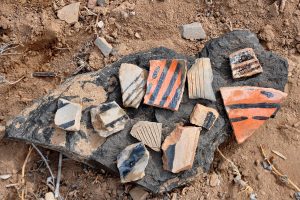 The recent snowstorm proven a bit rough for us. It could have been worse, of course. Instead of entire trees coming down, we lost huge limbs as big around as my thigh. They crashed down doing little damage to buildings or objects, save for some terra-cotta planting pots that instantly became potsherds.
The recent snowstorm proven a bit rough for us. It could have been worse, of course. Instead of entire trees coming down, we lost huge limbs as big around as my thigh. They crashed down doing little damage to buildings or objects, save for some terra-cotta planting pots that instantly became potsherds.
You’ve seen them in museums. I discovered recently that our Classics Department now displays several beautiful pieces of pottery in our building; I’m certain they also have drawers full of potsherds. And yet, for the longest time, I called these bits of broken pottery “potshards,” because a shard is a broken bit of something, true?
So, I discovered, is its ancestor, a shoord (Middle English) as well as its even older ancestor, a sceard (Old English). So we are still using a Middle English word, when we say “potsherd.” I suspect, with some resignation, that we all will say “shard” in a century, though I will not be present to hear that change. It has changed before; The OED lists pot-shoord, potsherde, pot sharde (as well as pot-shards) and Spencer’s “potshares” as antique spellings. A round 1800 the spelling settled down, like a sherd under a layer of clay, to our present form.
So when a purist talks about the fallen state of the English language in the time of our dopamine-dispensers also known at smart phones, remind the purist that language has been changing for millennia. Otherwise, when I wished you a Happy New Year, I would say “Glæd Nīwe Gēar Gesǣlig Nīwe Gēar.” Thanks to Omniglot for that translation.
Glæd Nīwe Gēar Gesǣlig Nīwe Gēar, all! Be sure to send me words and metaphors of use in academic settings, or merely intriguing, to me by leaving a comment below or by e-mail at jessid-at-richmond-dot-edu.
See all of our Metaphors of the Month here and Words of the Week here.
Creative-Commons image of potsherds courtesy of Wikipedia.